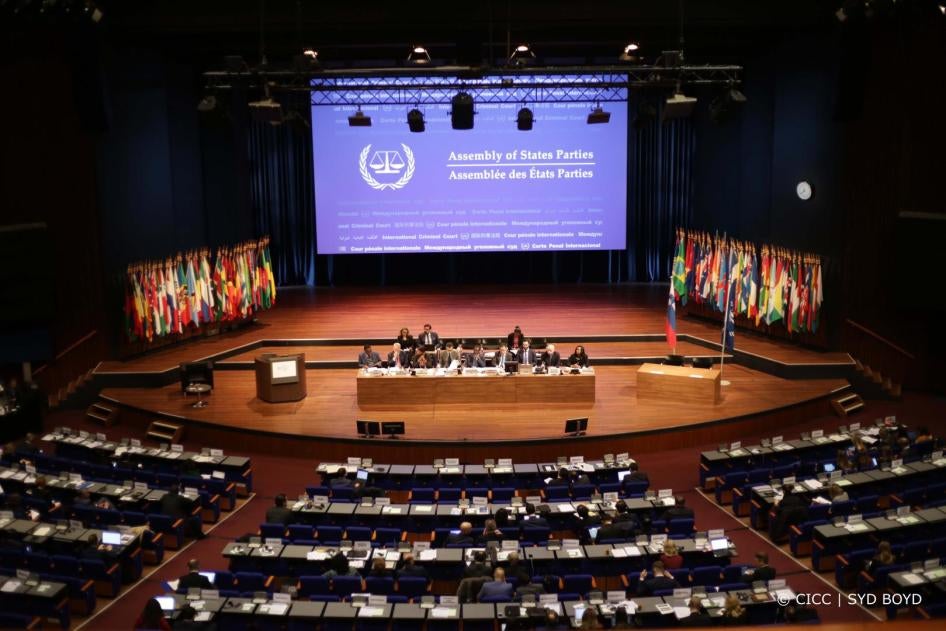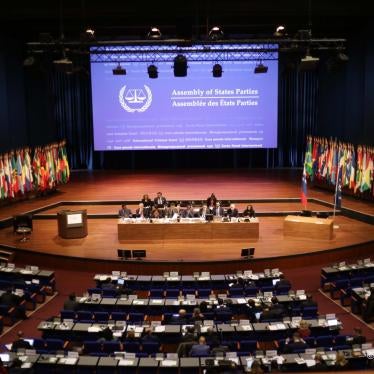(New York) – Member countries of the International Criminal Court (ICC) should step up their political, practical and financial support so that the court can fully deliver on its global mandate, Human Rights Watch said today. The annual session of the ICC’s Assembly of States Parties will take place in New York City from December 4 to 14, 2023.
The ICC’s docket includes Darfur, Israel/Palestine, and Ukraine, underscoring the court’s essential role in bringing accountability and defending the rule of law in the world’s conflicts. This year is the 25th anniversary of the adoption of the Rome Statute, the ICC’s founding treaty. Years of holding down budget increases to a bare minimum, as some member countries insisted on a zero nominal growth approach, has left the court without the resources it needs to support its work.
“The ICC aims to ensure that no one is above the law, but without consistent government support across its docket there is a risk of replicating double standards at the expense of victims’ access to justice,” said Liz Evenson, international justice director at Human Rights Watch. “Member countries at their annual meeting should speak out for equitable access to justice for all victims in situations before the court and back that commitment by bolstering the court’s budget.”
At this Assembly session, ICC member countries will make critical decisions for the functioning of the court, including setting its budget for 2024 and electing new ICC and Assembly leadership. Human Rights Watch issued a 20-page report making recommendations for the session to ICC member countries.
Member countries should demonstrate their commitment to impartial justice through action to set the court’s budget for next year at the level it needs to do its job in full independence, Human Rights Watch said. In 2022, ICC member countries approved an increase to the court’s annual budget that barely covered costs associated with inflation and was far below what the court had requested. While some countries have pledged additional voluntary funding, this is not a sustainable funding model and raises concerns of politicization of the court’s work.
The ICC is currently working in 17 situations with three ongoing trials and anchors a broader system for delivering justice for international crimes through courts at the national and international levels. The ICC depends on state cooperation, including for arrests. In August, South Africa confirmed its obligation to arrest Russian President Vladimir Putin ahead of a BRICS summit to be held in the country given the ICC’s outstanding warrant against him for serious crimes in Ukraine.
Government support is needed more consistently across the court’s docket, Human Rights Watch said.
The ICC prosecutor, Karim Khan, has an ongoing investigation into the situation in Palestine, which is a party to the ICC. Khan spoke to the court’s mandate in the context of the hostilities between Israel and Palestinian armed groups during a visit to Egypt in late October. He visited Israel and Palestine ahead of the Assembly session. On November 17, Bangladesh, Bolivia, the Comoros, Djibouti, and South Africa—all ICC member countries—referred the situation of Palestine to the court’s prosecutor. Palestine had also referred the situation in 2018 and affirmed its commitment to cooperate with the court.
Only a few ICC member countries have addressed the ICC’s role in the Palestine situation. This contrasts with the responses of many governments to Russia's full-scale invasion of Ukraine in February 2022. It has led to perceptions of double standards in government support for international justice, putting the ICC’s legitimacy at risk.
ICC member countries should use the Assembly session as a platform to formally speak about the court’s critical role in fighting impunity across all situations on its docket, including in the context of the hostilities between Israel and Palestinian armed groups, Human Rights Watch said.
Given the court’s mandate to bring justice for the world’s worst crimes, recurrent efforts to thwart accountability are unsurprising. In 2023, Russian authorities opened criminal cases and issued arrest warrants against the ICC prosecutor and several of the court’s judges. In September, the ICC was the target of a serious cyber attack with the objective of espionage. The court has not yet been able to confirm who was responsible for the attack.
The Assembly presidency, the court, and some member countries have condemned these efforts to intimidate or obstruct the court’s work, in line with an important strategy adopted in 2022 to oppose threats and attacks against “the Court, its officials, and those cooperating with it [emphasis added].” This strategy has yet to be used, however, to address threats to human rights groups advocating for justice before the court. In October, member countries adopted a set of “guidelines and recommendations for enhancing the security of participants in the work of the Assembly.” At the Assembly, member countries should commit to doing more to protect civic space so that human rights defenders can advance justice before the ICC without fear of reprisal, Human Rights Watch said.
The Assembly will also elect six new judges, one-third of the court’s bench. The merit-based election of highly qualified court officials is among the most important elements of ICC members’ stewardship of the court. For this election, candidates faced a novel procedure to assess their “high moral character,” a requirement for ICC officials under the Rome Statute. This was an important stepping stone toward the permanent vetting process for all elections of ICC officials, expected to be established during this Assembly session.
Member countries will also determine the future of the review by independent experts of the court’s performance, which in 2020 produced nearly 400 recommendations for change. Over the last three years, member countries and the court have assessed and started implementing the recommendations. As they decide on the next steps, member countries should remain committed to a structured follow-up that fosters continued efforts to strengthen the court’s delivery of justice, Human Rights Watch said. This should include annual reporting by the court and within the Assembly on how the recommendations are being implemented, while maintaining respect for the court’s judicial and prosecutorial independence, and ongoing and meaningful civil society engagement.
“ICC member countries’ willingness to support its impartial mandate faces a crucial test as many around the world are asking whether international law genuinely applies to all,” Evenson said. “Member countries should not miss the opportunity of the Assembly of States Parties session to denounce double standards and commit the support and resources the court needs to live up to the legitimate expectations of victims and affected communities.”








